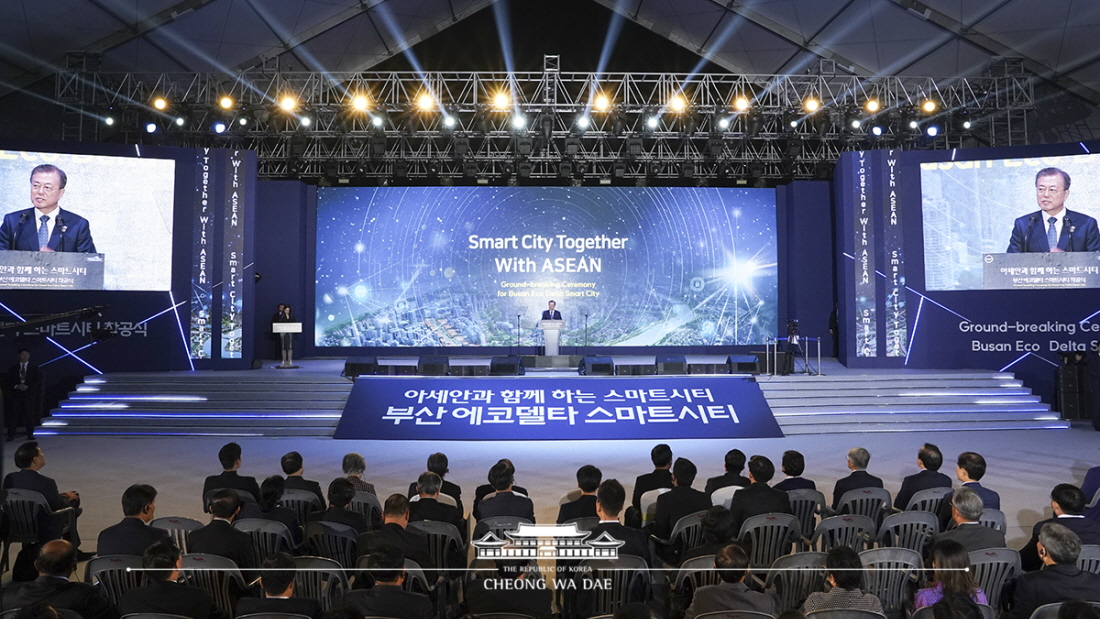이 웹사이트는 제19대 대통령 임기 종료에 따라 대통령기록관이 「대통령기록물 관리에 관한 법률」에 의해 이관받아 서비스하는 대통령기록물입니다. 자료의 열람만 가능하며 수정 · 추가 · 삭제는 불가능합니다.
다만, 「개인정보보호법」에 의하여 개인의 정보를 보호받기 원하시는 분은 관련 내용(요청자, 요청내용, 연락처, 글위치)을 대통령 웹기록물 담당자(044-211-2253)에게 요청해 주시면 신속히 검토하여 조치해 드리겠습니다. 감사합니다.
SPEECHES & REMARKS
BRIEFINGS
Remarks by President Moon Jae-in at Groundbreaking Ceremony for Busan Eco Delta Smart City

His Excellencies Prime Minister Prayut Chan-o-cha of Thailand, Prime Minister Nguyen Xuan Phuc of Viet Nam, Prime Minister Thongloun Sisoulith of Laos, Secretary-General of ASEAN Lim Jock Hoi and other delegations from ASEAN member states,
I am truly grateful to you all for attending this groundbreaking ceremony for the Busan Eco Delta Smart City project.
ASEAN is the world’s youngest, most dynamic and fastest growing region.
The cities of ASEAN are changing by the day. Manila and Jakarta have already become international metropolises, each with populations in excess of 10 million.
The United Nations Environment Program predicts that Bangkok and Ho Chi Minh City will grow into megacities with populations of close to 10 million by 2030. At the same time, Batam of Indonesia, Vientiane of Laos and other cities will be home to two million or more.
This city of Busan has also grown rapidly. Its population stood at 280,000 in 1945, but now has reached 3.5 million.
We have experience in this regard. Rapid urban growth brings numerous side-effects. As urban planning has been unable to keep pace with the speed of population growth, densely populated areas have reached as far as half-way up mountainsides. The street network could not stay abreast of the urban expansion, causing severe traffic congestion. Public administration as well as essential infrastructure related to medical and public health services, water and sewage and public safety have all become inadequate. Severe environmental pollution has also become inevitable.
For these reasons, the Republic of Korea has been striving to address urban problems early on. We have managed to elevate urban sustainability in Seoul, Incheon and here in Busan by building new planned cities in the suburbs, regenerating old downtown areas and upgrading the infrastructure.
Now, Korea is about to take a new approach. We are building upon the foundation of Fourth Industrial Revolution technology to design a new future city that can resolve urban problems and serve as the platform for innovative growth.
Busan Eco Delta Smart City is being realized as a result of these efforts.
ASEAN leaders and delegations from member states,
Korea has experienced traffic congestion, environmental pollution, catastrophes and disasters that have accompanied urban sprawl. The smart city is infused with all the methods we’ve applied to address these problems. The cities of ASEAN are also experiencing the same problems and searching for the same kinds of answers. I believe the Korean-style “smart city” can offer them one model in this regard.
On this empty plain beside the Nakdong-gang River, innovative technologies developed in the Fourth Industrial Revolution will be used to connect all urban infrastructure. This will be a new city that enriches the quality of life for residents. A multi-functional space, used for learning, work and play, will be built upon a sustainable urban platform, which centers on new and renewable energy sources. Residents will also be provided with an intelligent prediction system for disasters and catastrophes as well as fast and precise safety and rescue services.
The technologies and experiences accumulated while building the smart city are not confined to the construction of a new planned city. We can apply what we learn to solve problems in existing cities and original downtown areas. In this way, urban communities, both old and new, can be made into cities for the future, where all can prosper together.
I’m looking at ASEAN’s potential in the smart city area.
If a common smart city platform is developed within the infrastructure that ASEAN member states are putting in place, intraregional connectivity will be enhanced and “mutual advancement” can be expedited.
The diversity of ASEAN cities is another important strength. Just consider the smart city pilot projects chosen by the ASEAN Smart City Network that are currently underway in 26 cities in 10 ASEAN member countries. These related projects are diverse, including transportation, tourism, construction, trade, government administration, disaster response, water resource management and environmental protection.
ASEAN cities are hundreds and even thousands of years old. They need to achieve sustainable development while preserving their historic importance and identities.
Korea will work with ASEAN cities. We will share our experience in building and running Busan Eco Delta Smart City, establishing a system of cooperation with ASEAN cities.
This ASEAN-Republic of Korea Commemorative Summit provides an opportunity for us to work more closely together on smart cities. We aim to open up the future of smart cities worldwide by cooperating with Singapore’s Smart Nation initiative, Myanmar’s Dala New City Project and Malaysia’s Kota Kinabalu smart city project.
Honorable ASEAN leaders and delegates,
The genuine smart city is an urban community where people live in harmony with nature, where a high quality of life is provided, and where the good life is shared in neighboring cities and countries.
In this regard, the smart city is a place imbued with the inclusive “Asian spirit,” where neither nature nor any person is excluded.
The smart city is a new platform that embraces innovative, forward-looking technologies and new industries. If ASEAN and Korea capture the “Asian spirit” here, we can lead the world in the smart city sector.
I look forward to your interest and cooperation to create the first successful model at Busan Eco Delta Smart City.
Thank you.



